Knowledge Economy in Saudi Arabia: Vision 2030 & Transformation
VerifiedAdded on 2023/04/23
|5
|976
|191
Essay
AI Summary
This essay provides an overview of the knowledge-based economy (KBE), highlighting its main features such as the focus on knowledge and information as key drivers of productivity, investment in high-tech industries, and the increasing demand for skilled labor. It discusses the reasons why countries, particularly Saudi Arabia, are shifting towards a KBE to improve productivity, diversify their economies, and reduce dependence on oil revenues. The essay further examines Saudi Arabia's transformation efforts through initiatives like the National Transformation Program 2020 and Vision 2030, which aim to enhance the role of the private sector, improve the education infrastructure, attract global talent, and develop non-oil industries. The analysis emphasizes the importance of these programs in creating a more resilient and diversified economy for Saudi Arabia, reducing unemployment, and fostering sustainable growth.
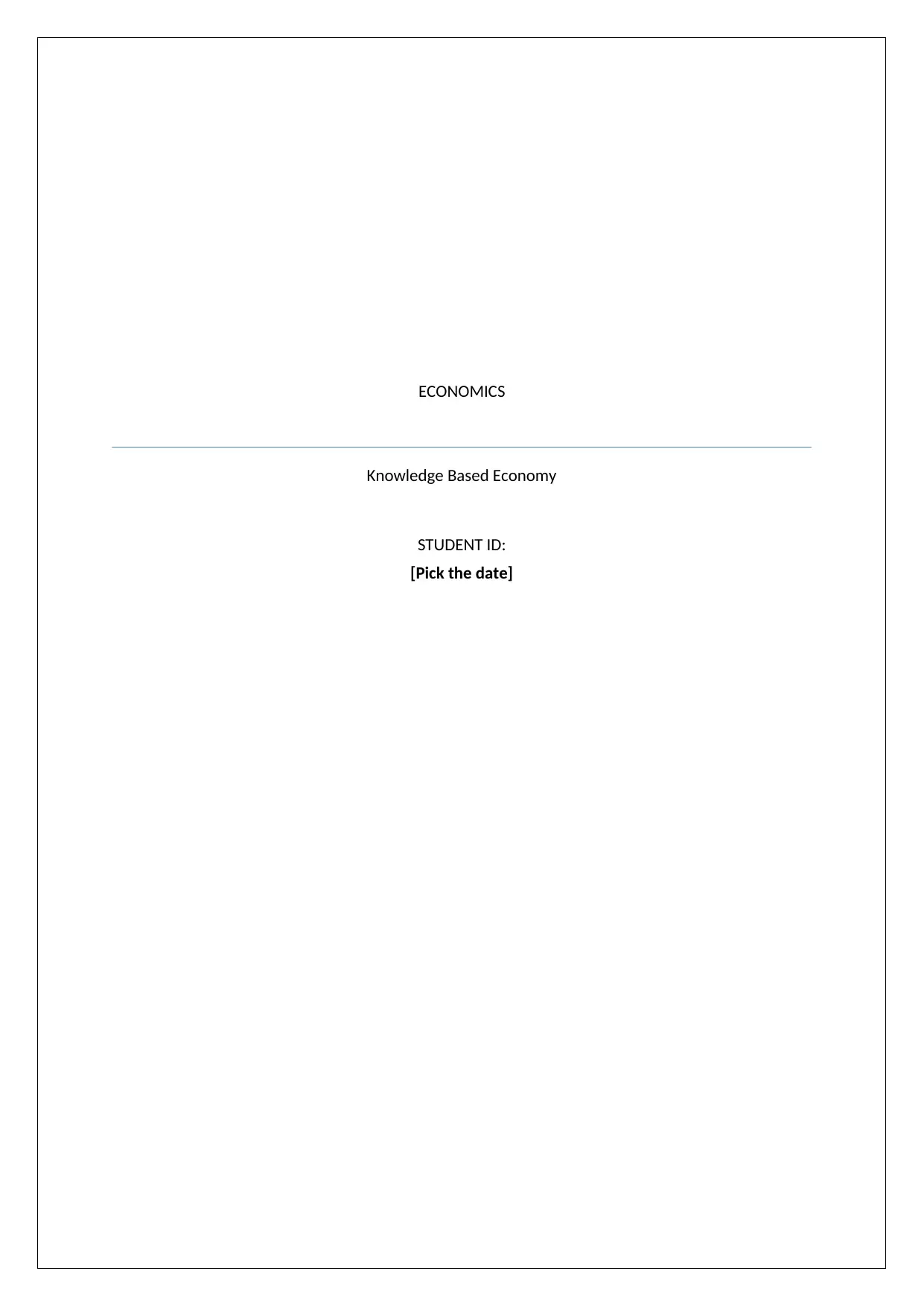
ECONOMICS
Knowledge Based Economy
STUDENT ID:
[Pick the date]
Knowledge Based Economy
STUDENT ID:
[Pick the date]
Paraphrase This Document
Need a fresh take? Get an instant paraphrase of this document with our AI Paraphraser
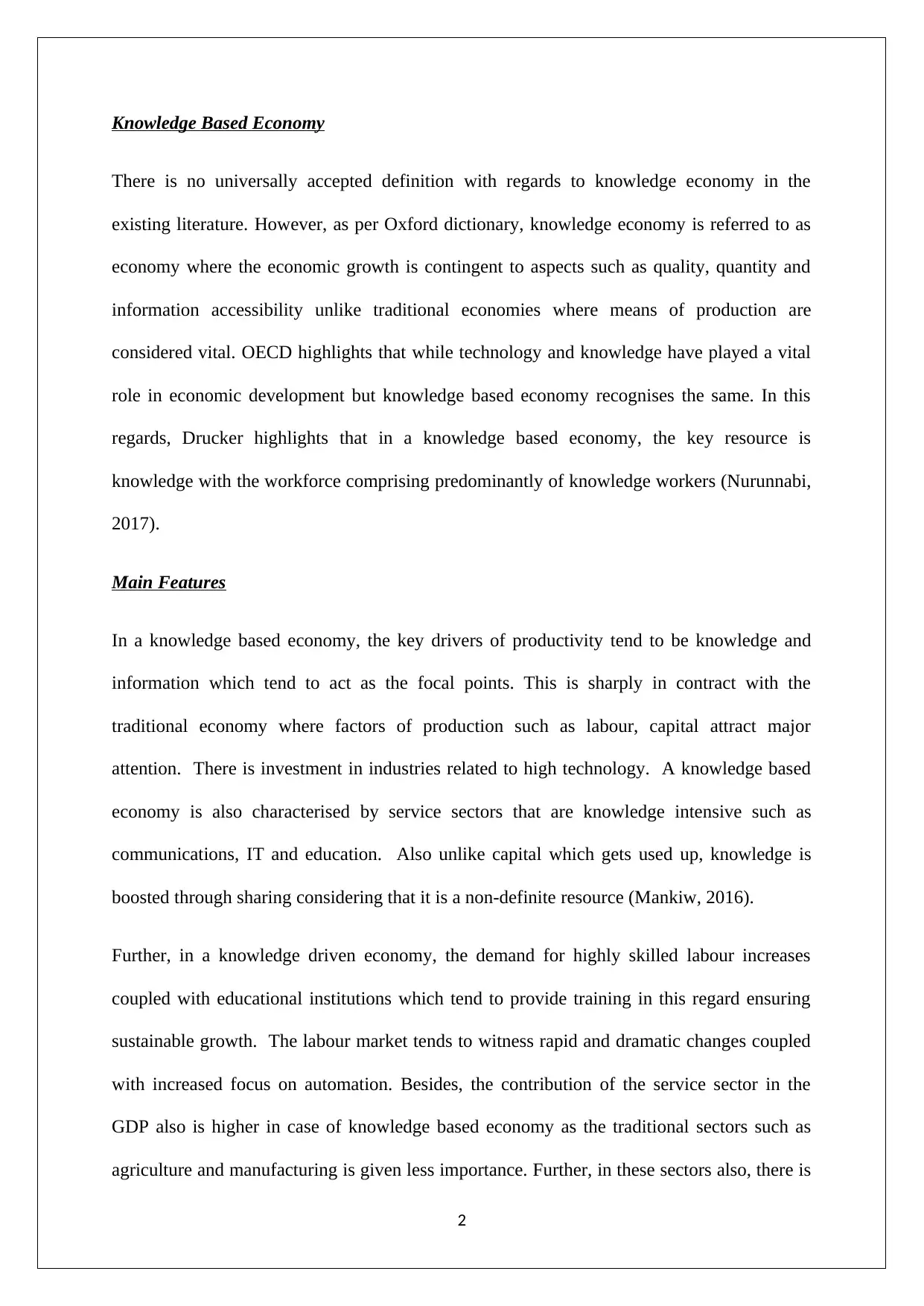
Knowledge Based Economy
There is no universally accepted definition with regards to knowledge economy in the
existing literature. However, as per Oxford dictionary, knowledge economy is referred to as
economy where the economic growth is contingent to aspects such as quality, quantity and
information accessibility unlike traditional economies where means of production are
considered vital. OECD highlights that while technology and knowledge have played a vital
role in economic development but knowledge based economy recognises the same. In this
regards, Drucker highlights that in a knowledge based economy, the key resource is
knowledge with the workforce comprising predominantly of knowledge workers (Nurunnabi,
2017).
Main Features
In a knowledge based economy, the key drivers of productivity tend to be knowledge and
information which tend to act as the focal points. This is sharply in contract with the
traditional economy where factors of production such as labour, capital attract major
attention. There is investment in industries related to high technology. A knowledge based
economy is also characterised by service sectors that are knowledge intensive such as
communications, IT and education. Also unlike capital which gets used up, knowledge is
boosted through sharing considering that it is a non-definite resource (Mankiw, 2016).
Further, in a knowledge driven economy, the demand for highly skilled labour increases
coupled with educational institutions which tend to provide training in this regard ensuring
sustainable growth. The labour market tends to witness rapid and dramatic changes coupled
with increased focus on automation. Besides, the contribution of the service sector in the
GDP also is higher in case of knowledge based economy as the traditional sectors such as
agriculture and manufacturing is given less importance. Further, in these sectors also, there is
2
There is no universally accepted definition with regards to knowledge economy in the
existing literature. However, as per Oxford dictionary, knowledge economy is referred to as
economy where the economic growth is contingent to aspects such as quality, quantity and
information accessibility unlike traditional economies where means of production are
considered vital. OECD highlights that while technology and knowledge have played a vital
role in economic development but knowledge based economy recognises the same. In this
regards, Drucker highlights that in a knowledge based economy, the key resource is
knowledge with the workforce comprising predominantly of knowledge workers (Nurunnabi,
2017).
Main Features
In a knowledge based economy, the key drivers of productivity tend to be knowledge and
information which tend to act as the focal points. This is sharply in contract with the
traditional economy where factors of production such as labour, capital attract major
attention. There is investment in industries related to high technology. A knowledge based
economy is also characterised by service sectors that are knowledge intensive such as
communications, IT and education. Also unlike capital which gets used up, knowledge is
boosted through sharing considering that it is a non-definite resource (Mankiw, 2016).
Further, in a knowledge driven economy, the demand for highly skilled labour increases
coupled with educational institutions which tend to provide training in this regard ensuring
sustainable growth. The labour market tends to witness rapid and dramatic changes coupled
with increased focus on automation. Besides, the contribution of the service sector in the
GDP also is higher in case of knowledge based economy as the traditional sectors such as
agriculture and manufacturing is given less importance. Further, in these sectors also, there is
2
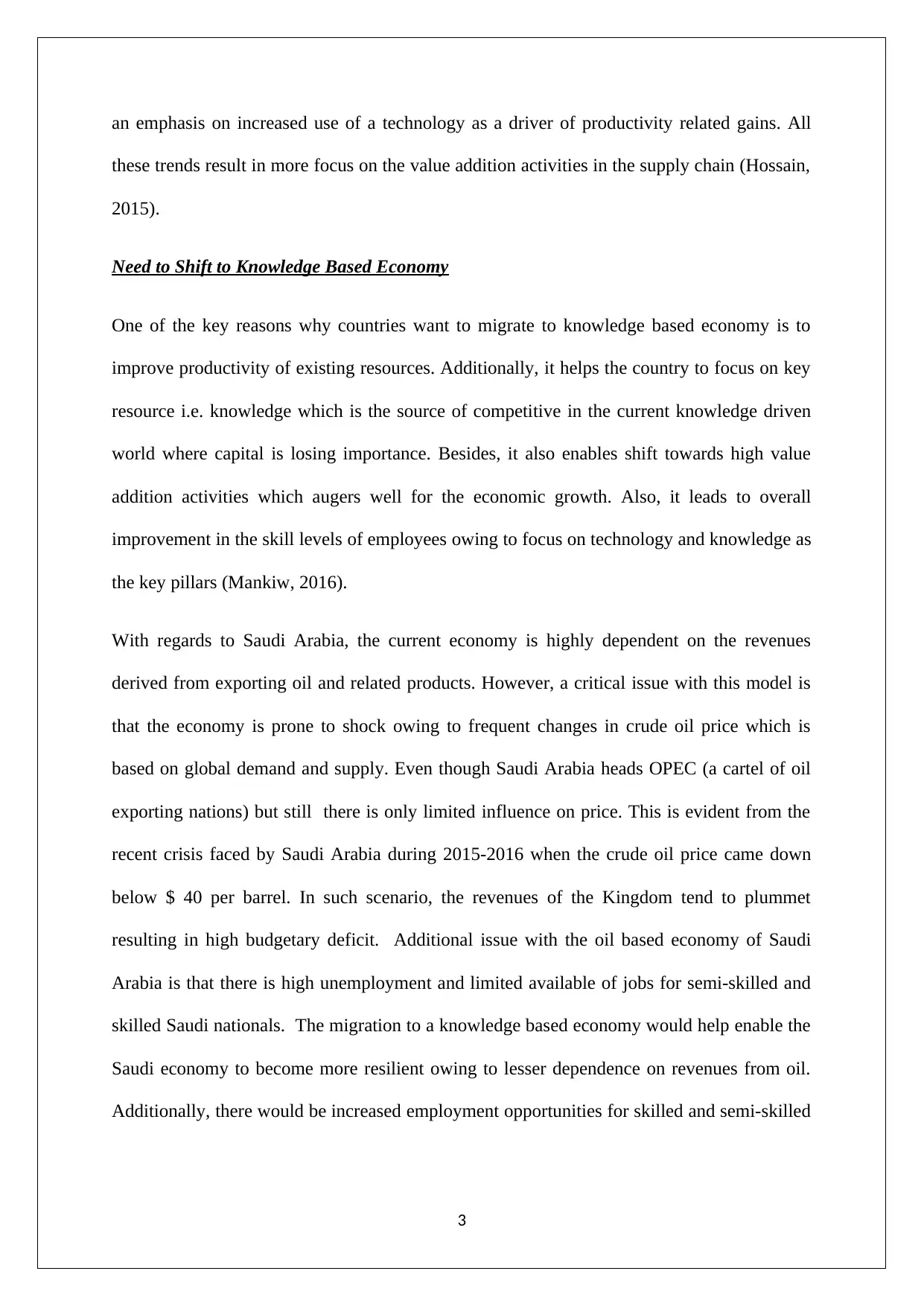
an emphasis on increased use of a technology as a driver of productivity related gains. All
these trends result in more focus on the value addition activities in the supply chain (Hossain,
2015).
Need to Shift to Knowledge Based Economy
One of the key reasons why countries want to migrate to knowledge based economy is to
improve productivity of existing resources. Additionally, it helps the country to focus on key
resource i.e. knowledge which is the source of competitive in the current knowledge driven
world where capital is losing importance. Besides, it also enables shift towards high value
addition activities which augers well for the economic growth. Also, it leads to overall
improvement in the skill levels of employees owing to focus on technology and knowledge as
the key pillars (Mankiw, 2016).
With regards to Saudi Arabia, the current economy is highly dependent on the revenues
derived from exporting oil and related products. However, a critical issue with this model is
that the economy is prone to shock owing to frequent changes in crude oil price which is
based on global demand and supply. Even though Saudi Arabia heads OPEC (a cartel of oil
exporting nations) but still there is only limited influence on price. This is evident from the
recent crisis faced by Saudi Arabia during 2015-2016 when the crude oil price came down
below $ 40 per barrel. In such scenario, the revenues of the Kingdom tend to plummet
resulting in high budgetary deficit. Additional issue with the oil based economy of Saudi
Arabia is that there is high unemployment and limited available of jobs for semi-skilled and
skilled Saudi nationals. The migration to a knowledge based economy would help enable the
Saudi economy to become more resilient owing to lesser dependence on revenues from oil.
Additionally, there would be increased employment opportunities for skilled and semi-skilled
3
these trends result in more focus on the value addition activities in the supply chain (Hossain,
2015).
Need to Shift to Knowledge Based Economy
One of the key reasons why countries want to migrate to knowledge based economy is to
improve productivity of existing resources. Additionally, it helps the country to focus on key
resource i.e. knowledge which is the source of competitive in the current knowledge driven
world where capital is losing importance. Besides, it also enables shift towards high value
addition activities which augers well for the economic growth. Also, it leads to overall
improvement in the skill levels of employees owing to focus on technology and knowledge as
the key pillars (Mankiw, 2016).
With regards to Saudi Arabia, the current economy is highly dependent on the revenues
derived from exporting oil and related products. However, a critical issue with this model is
that the economy is prone to shock owing to frequent changes in crude oil price which is
based on global demand and supply. Even though Saudi Arabia heads OPEC (a cartel of oil
exporting nations) but still there is only limited influence on price. This is evident from the
recent crisis faced by Saudi Arabia during 2015-2016 when the crude oil price came down
below $ 40 per barrel. In such scenario, the revenues of the Kingdom tend to plummet
resulting in high budgetary deficit. Additional issue with the oil based economy of Saudi
Arabia is that there is high unemployment and limited available of jobs for semi-skilled and
skilled Saudi nationals. The migration to a knowledge based economy would help enable the
Saudi economy to become more resilient owing to lesser dependence on revenues from oil.
Additionally, there would be increased employment opportunities for skilled and semi-skilled
3
⊘ This is a preview!⊘
Do you want full access?
Subscribe today to unlock all pages.

Trusted by 1+ million students worldwide
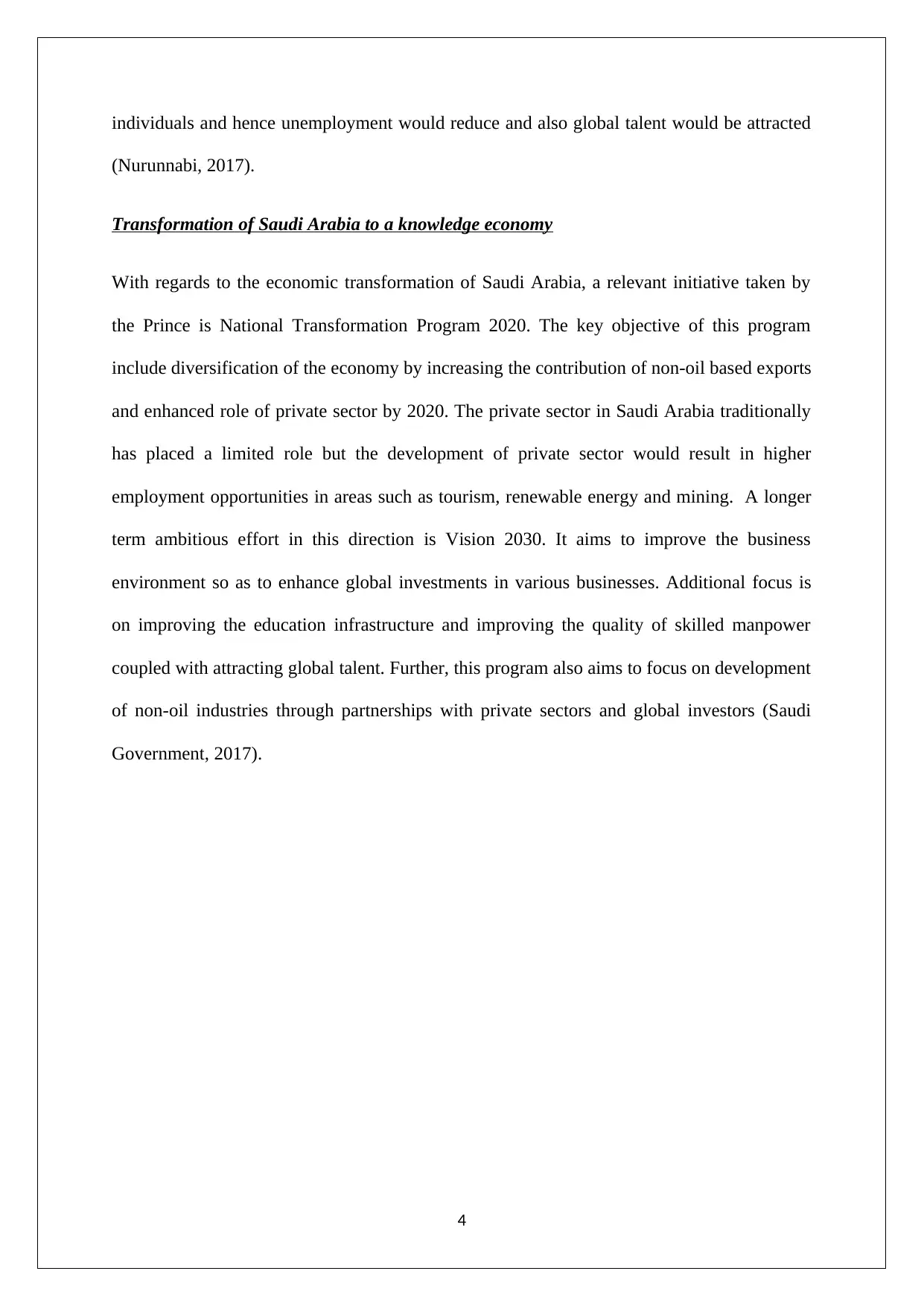
individuals and hence unemployment would reduce and also global talent would be attracted
(Nurunnabi, 2017).
Transformation of Saudi Arabia to a knowledge economy
With regards to the economic transformation of Saudi Arabia, a relevant initiative taken by
the Prince is National Transformation Program 2020. The key objective of this program
include diversification of the economy by increasing the contribution of non-oil based exports
and enhanced role of private sector by 2020. The private sector in Saudi Arabia traditionally
has placed a limited role but the development of private sector would result in higher
employment opportunities in areas such as tourism, renewable energy and mining. A longer
term ambitious effort in this direction is Vision 2030. It aims to improve the business
environment so as to enhance global investments in various businesses. Additional focus is
on improving the education infrastructure and improving the quality of skilled manpower
coupled with attracting global talent. Further, this program also aims to focus on development
of non-oil industries through partnerships with private sectors and global investors (Saudi
Government, 2017).
4
(Nurunnabi, 2017).
Transformation of Saudi Arabia to a knowledge economy
With regards to the economic transformation of Saudi Arabia, a relevant initiative taken by
the Prince is National Transformation Program 2020. The key objective of this program
include diversification of the economy by increasing the contribution of non-oil based exports
and enhanced role of private sector by 2020. The private sector in Saudi Arabia traditionally
has placed a limited role but the development of private sector would result in higher
employment opportunities in areas such as tourism, renewable energy and mining. A longer
term ambitious effort in this direction is Vision 2030. It aims to improve the business
environment so as to enhance global investments in various businesses. Additional focus is
on improving the education infrastructure and improving the quality of skilled manpower
coupled with attracting global talent. Further, this program also aims to focus on development
of non-oil industries through partnerships with private sectors and global investors (Saudi
Government, 2017).
4
Paraphrase This Document
Need a fresh take? Get an instant paraphrase of this document with our AI Paraphraser
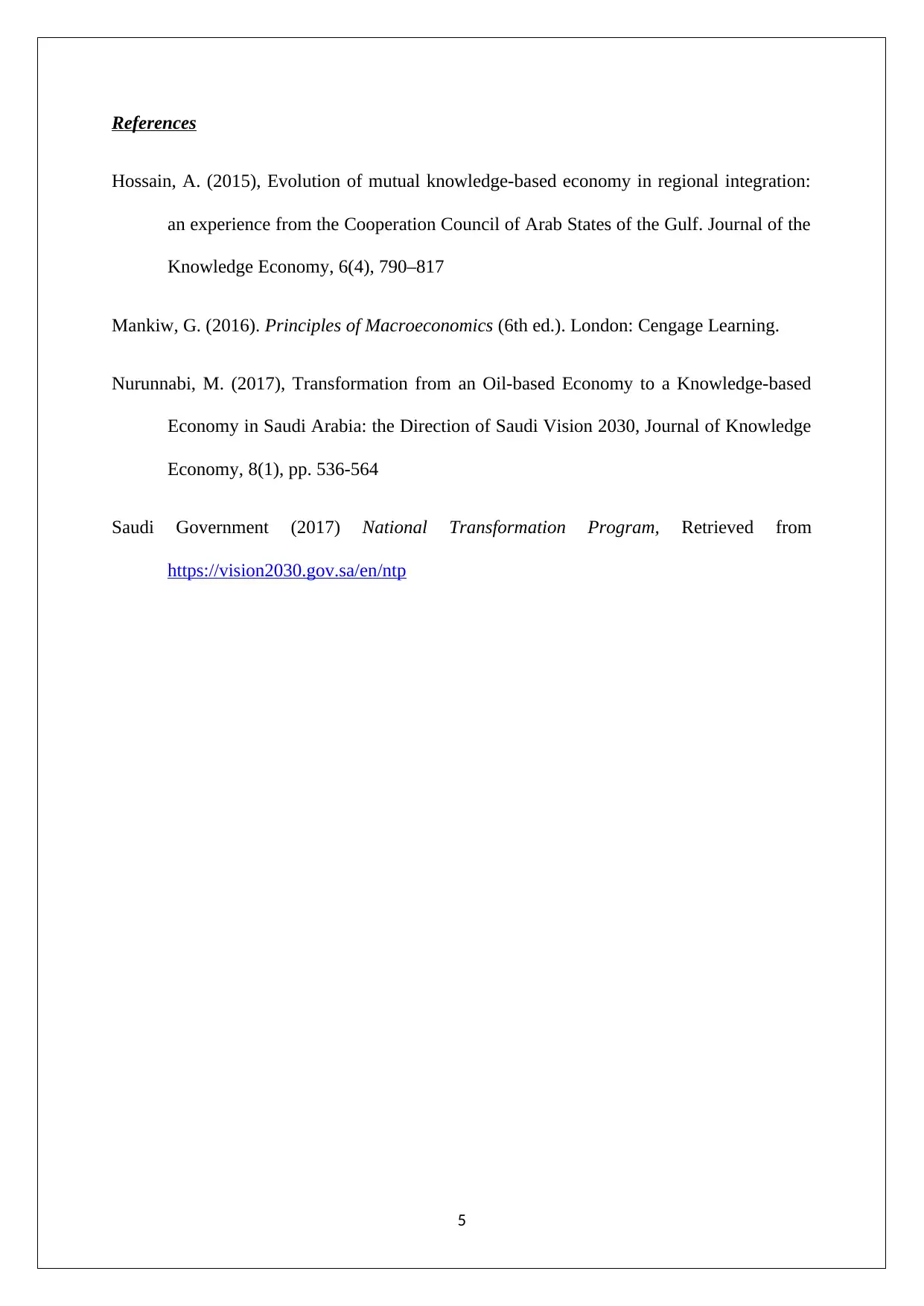
References
Hossain, A. (2015), Evolution of mutual knowledge-based economy in regional integration:
an experience from the Cooperation Council of Arab States of the Gulf. Journal of the
Knowledge Economy, 6(4), 790–817
Mankiw, G. (2016). Principles of Macroeconomics (6th ed.). London: Cengage Learning.
Nurunnabi, M. (2017), Transformation from an Oil-based Economy to a Knowledge-based
Economy in Saudi Arabia: the Direction of Saudi Vision 2030, Journal of Knowledge
Economy, 8(1), pp. 536-564
Saudi Government (2017) National Transformation Program, Retrieved from
https://vision2030.gov.sa/en/ntp
5
Hossain, A. (2015), Evolution of mutual knowledge-based economy in regional integration:
an experience from the Cooperation Council of Arab States of the Gulf. Journal of the
Knowledge Economy, 6(4), 790–817
Mankiw, G. (2016). Principles of Macroeconomics (6th ed.). London: Cengage Learning.
Nurunnabi, M. (2017), Transformation from an Oil-based Economy to a Knowledge-based
Economy in Saudi Arabia: the Direction of Saudi Vision 2030, Journal of Knowledge
Economy, 8(1), pp. 536-564
Saudi Government (2017) National Transformation Program, Retrieved from
https://vision2030.gov.sa/en/ntp
5
1 out of 5
Related Documents
Your All-in-One AI-Powered Toolkit for Academic Success.
+13062052269
info@desklib.com
Available 24*7 on WhatsApp / Email
![[object Object]](/_next/static/media/star-bottom.7253800d.svg)
Unlock your academic potential
Copyright © 2020–2026 A2Z Services. All Rights Reserved. Developed and managed by ZUCOL.





